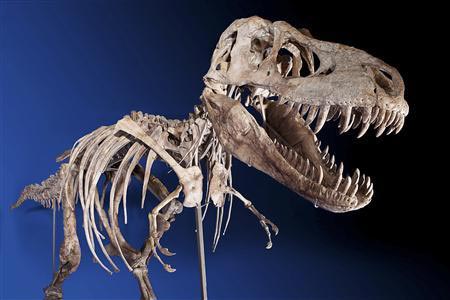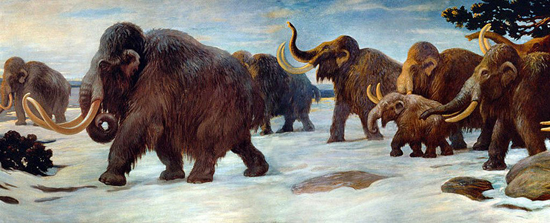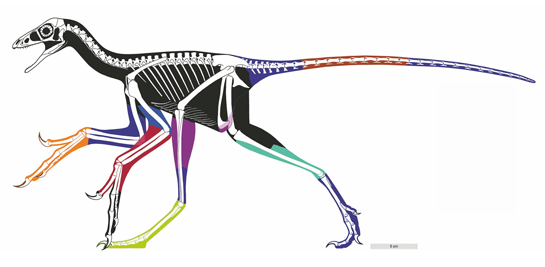U.S. Immigration and Customs Expected to Act on Friday (22nd June)
The mounted skeleton of an Asian cousin of Tyrannosaurus rex is expected to be seized by U.S. Custom officials tomorrow as the international legal dispute over the rightful ownership of this fossil specimen continues. The eight-metre-long, mounted skeleton of a Tarbosaurus bataar was auctioned in New York last month, it fetched over £630,000 GBP when it went under the hammer, but from the day the auction lot was announced it has attracted controversy.
Tarbosaurus bataar
To read about the T. bataar fossil coming up for auction: Tyrannosaurid Up for Auction.
A team of palaeontologists from North America and Mongolia examined the specimen after the sale, once a court order had been put in place to prevent the movement of the specimen to the private individual who had bid the highest at the New York based auction. These experts declared that the fossils had originated from Mongolia, most probably the Nemegt Formation where a number of Tarbosaurus fossils have been discovered. It has been illegal for more than fifty years to excavate and take fossils out of Mongolia and it is suspected that this particular specimen was collected by poachers and smuggled out of the country.
To read more about the palaeontologist’s study of the Tarbosaurus remains: Experts state that Tarbosaurus fossils definitely smuggled out of Mongolia.
The Tarbosaurus Specimen Under Investigation
Picture credit: Reuters/Heritage Auctions
When team members at Everything Dinosaur were first informed about the intended auction, they signed an on-line petition to help stop the sale taking place, as they were aware that it had been against the law in Mongolia to export such specimens. Now a warrant that allows U.S. officials to seize the fossil has been signed by a New York based federal judge.
Commenting on the case, Luis Martinez, a spokes person for the U.S. Immigration and Customs stated:
“We should have it by the end of the week.”
The government of Mongolia will no doubt, welcome this move, prior to the auction the Mongolian President personally intervened to try to stop the sale. Mongolia is claiming sovereign ownership of the T. bataar specimen and wanting the fossils returned to Mongolia.
Mongolian Government Request
At the request of the Mongolian government, a U.S. District judge in Dallas (Texas) issued a restraining order preventing the skeleton from being moved or the ownership transferred while the dispute continued. Manhattan U.S. Attorney Preet Bharara filed a lawsuit on Monday seeking the forfeiture of the nearly intact skeleton and its return to the Mongolian government.
In New York, U.S. District Judge Kevin Castel on Tuesday issued an order to seize the fossil, ruling there was probable cause it was subject to forfeiture under federal laws due to false claims made regarding the value of the imported item into the USA from the United Kingdom and other infringements concerning the customs paperwork.
A spokesperson stated:
“From a legal standpoint, the U.S. government’s lawsuit shifts the burden of proof from Mongolia to Heritage [Heritage Auctions who organised the original sale in New York] and others who might make a claim to its ownership.”
Heritage Auction officials have stressed from the beginning that they would cooperate with authorities, keen to avoid any adverse publicity and any legal ramifications for their part in the sale. The company maintains that the fossil was legally obtained and brought to auction by a reputable consignor.
Jim Halperin, Co-chairman of Heritage Auctions said in a statement:
“We believe our consignor purchased fossils in good faith, then spent a year of his life and considerable expense identifying, restoring, mounting and preparing what had previously been a much less valuable matrix of unassembled, underlying bones and bone fragments. We sincerely hope there is a just and fair outcome for all parties.”
U.S. federal officials claim that the smugglers made false statements about the skeleton when it was imported into the United States from the UK in 2010. The skeleton did not originate in Britain nor was its value only $15,000 (£10,000) as claimed, the officials assert.
Mongolia has has strict laws in place for five decades regarding the excavation, removal and shipment of fossils and other rare artefacts from the country. Such items are considered property of the Mongolian government. It is likely that this fossil specimen was removed from Mongolia between 1995 and 2005 according to the palaeontologists who examined the Tarbosaurus.
We expect this dispute to rumble on, but hopefully action taken by the U.S. authorities will serve as a deterrent and prevent the smuggling of other specimens out of Asia for sale in the West.
To view models of Tarbosaurus (whilst stocks last): Theropods and Dinosaur Figures (PNSO).






Leave A Comment